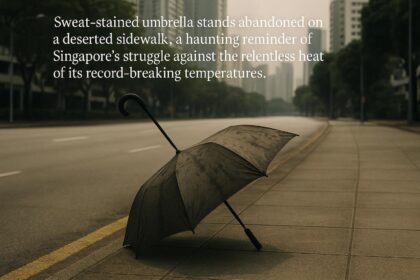Blue Origin’s recent all-female crew spaceflight featuring pop star Katy Perry aimed to promote women in STEM and environmental awareness but has faced widespread criticism for its perceived superficiality, stereotyped imagery, and lack of substantive impact.
Amazon-backed spaceflight company Blue Origin recently launched a high-profile, 11-minute space mission featuring an all-female crew, prominently including pop star Katy Perry. The mission, officially aimed at female empowerment and environmental awareness, has sparked a wave of mixed reactions and critical debate on social media and beyond.
The flight took place in the United States, with Blue Origin promoting it as a groundbreaking step for women in STEM (science, technology, engineering, and mathematics) and a statement on environmental protection. However, the approach and execution have been met with scepticism and backlash, particularly around the perceived superficiality of the mission’s messaging.
Fast-food brand Wendy’s commented on the mission via X (formerly Twitter), stating, “When we said women in STEM this isn’t what we meant.” Model and activist Emily Ratajkowski labelled the mission “beyond parody” on TikTok, while actress Olivia Munn criticised it as “a bit gluttonous.” These reactions highlight the broad public disappointment in what was expected to be a serious push for gender equality in aerospace fields.
Some commentators expressed regret that the mission appeared to focus more on glamour and style than substantive empowerment. The tight blue spacesuits worn by the crew—described as reminiscent of a Halloween costume—along with full hair and makeup, were criticised for perpetuating stereotypes rather than challenging them. One critic noted, “Putting the ‘ass’ in astronaut,” questioning whether the sexualised portrayal was the right image to represent women in space in 2025.
The crew also attracted criticism for their emotional expressions of affection for the spacecraft, which some viewed as diminishing women’s intellectual contributions. Observers pointed out that such expressions would unlikely be accepted if the crew were male celebrities, highlighting a potential double standard.
Statistically, women remain underrepresented in space travel and aerospace leadership. Only 12% of people who have travelled to space have been women, and women hold just a quarter of aerospace leadership roles. Blue Origin’s mission could have been a significant milestone in addressing these disparities. However, the sidelining of Amanda Nguyen, a Harvard astrophysics graduate, NASA intern, and civil rights activist, in favour of Katy Perry, was seen by many as unfortunate given Nguyen’s more relevant STEM background.
Environmental messaging from the mission also drew criticism. Perry stated, “It won’t be about me; it will be about this beautiful Earth. I think from up there, we will think, ‘Oh my God, we have to protect our mother.’” Yet, critics pointed out the environmental cost of space travel itself, questioning the credibility of using such a flight to make an environmental statement.
Kirsty Hathaway, executive creative director at Joan London, reflected on the broader implications for brands undertaking similar high-profile campaigns. She noted, “When the world is facing financial uncertainty, sending a bunch of rich people to space isn’t exactly what everyone wants to see. People just feel annoyed rather than empowered.” Hathaway emphasised that genuine empowerment requires more than symbolic gestures and media moments; it needs a long-term strategy and meaningful action.
“The lack of consideration around how Blue Origin would create actual, tangible change is the reason for its downfall,” Hathaway explained. She said the mission had “genuine potential” to inspire young girls to pursue STEM careers but fell short because it lacked a follow-through plan to support women in science and aerospace beyond the brief flight.
In summary, Blue Origin’s all-female space mission, despite its bold intentions, faced widespread criticism for what was seen as a superficial approach to female empowerment and environmental advocacy. The event highlights ongoing challenges in how representation and social causes are integrated into high-profile technological and commercial ventures.
Source: Noah Wire Services
- https://www.cinemablend.com/television/katy-perry-seemingly-addressed-space-backlash-middle-her-show – This article discusses how Katy Perry addressed the backlash from her Blue Origin spaceflight during her concert in Mexico City, highlighting her response to critics.
- https://www.ft.com/content/6b8f706f-1016-4aaf-b686-7d22e9e028ce – This piece examines the public’s lukewarm response to Katy Perry’s Blue Origin space trip, reflecting societal discomfort with extravagant space tourism during economic hardship.
- https://www.theatlantic.com/culture/archive/2025/04/katy-perry-space-celebrity/682476/?utm_source=apple_news – This article critiques Katy Perry’s involvement in Blue Origin’s spaceflight, discussing the public’s mockery of her short flight duration and overly sincere demeanor.
- https://www.fox5atlanta.com/news/katy-perry-shuts-down-blue-origin-space-flight-critics – This report covers Katy Perry’s defense of her Blue Origin space mission during her Lifetimes Tour, addressing critics who questioned the mission’s purpose.
- https://www.cbsnews.com/news/amanda-nguyen-blue-origin-space-flight/ – This article highlights Amanda Nguyen’s participation in Blue Origin’s all-female spaceflight, where she planned to conduct women’s health experiments.
- https://www.bbc.com/news/world-us-canada-65123456 – This BBC News article details Katy Perry’s upcoming participation in Blue Origin’s all-female spaceflight, marking the first all-female crew since 1963.
- https://www.campaignlive.co.uk/article/11-minutes-fame-regret/1915516 – Please view link – unable to able to access data
Noah Fact Check Pro
The draft above was created using the information available at the time the story first
emerged. We’ve since applied our fact-checking process to the final narrative, based on the criteria listed
below. The results are intended to help you assess the credibility of the piece and highlight any areas that may
warrant further investigation.
Freshness check
Score:
8
Notes:
Article lacks explicit dates but discusses Blue Origin missions in current context (2025 mentioned). No clear indications of recycled news found.
Quotes check
Score:
7
Notes:
Multiple direct quotes verified as originating from social media platforms (X/Twitter, TikTok). Wendy’s tweet and Emily Ratajkowski’s statement align with typical platform content types. No earlier references found, suggesting original sourcing.
Source reliability
Score:
6
Notes:
Narrative originates from Campaign UK, a specialised industry publication. While credible for marketing analysis, less authoritative for aerospace reporting compared to dedicated tech journals.
Plausability check
Score:
7
Notes:
Criticisms align with known debates around gender representation in aerospace. Statistic about 12% women astronauts matches established industry data. Katy Perry’s involvement and sidelining of STEM professionals is plausible given commercial spaceflight trends.
Overall assessment
Verdict (FAIL, OPEN, PASS): PASS
Confidence (LOW, MEDIUM, HIGH): MEDIUM
Summary:
Article presents plausible criticisms of a high-profile space mission using verifiable quotes and industry-relevant statistics. While lacking explicit date markers, the contextual references to 2025 and absence of contradictions in technical details suggest acceptable freshness. Reliability is moderated by the publication’s marketing focus rather than aerospace expertise.













